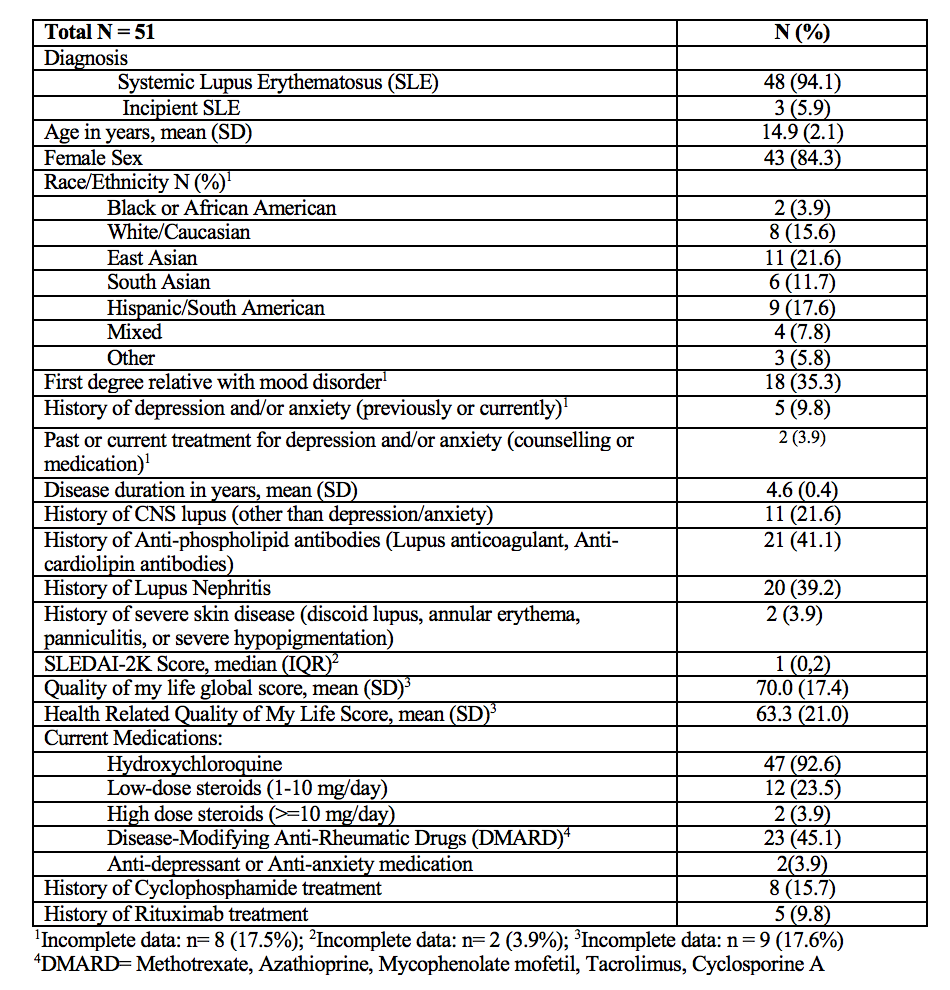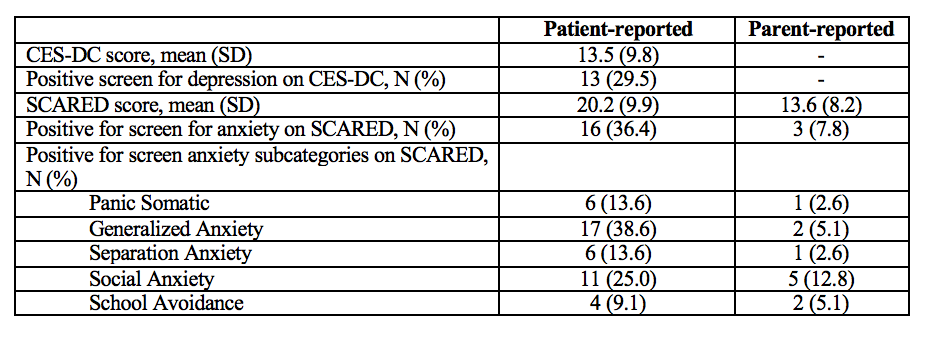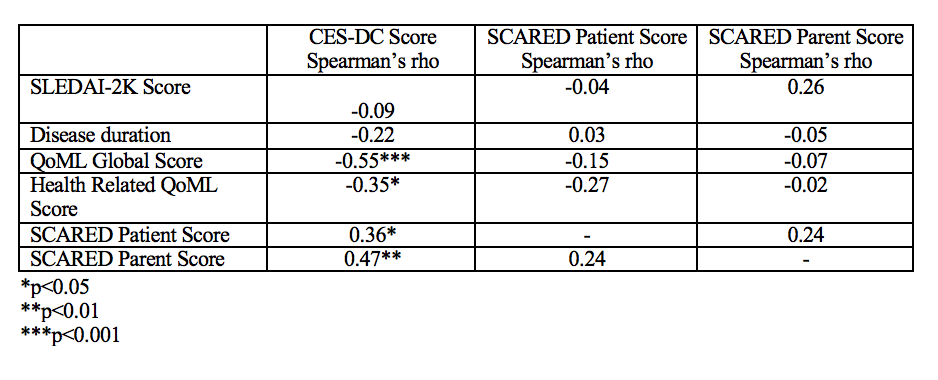Session Information
Date: Monday, November 11, 2019
Title: Pediatric Rheumatology – ePoster II: SLE, Juvenile Dermatomyositis, & Scleroderma
Session Type: Poster Session (Monday)
Session Time: 9:00AM-11:00AM
Background/Purpose: Depression and anxiety disorders are common in patients with childhood-onset systemic lupus erythematosus (cSLE). It is unclear if they are due to central nervous system involvement, secondary to a chronic illness or to treatment. We aimed to determine the prevalence and risk factors for clinically elevated depression and anxiety symptoms in a cohort of children with SLE.
Methods: Eligible participants for this cross-sectional study were all patients >8 years old who were seen in the cSLE clinic at The Hospital for Sick Children between July 2017 and January 2019, with cSLE or incipient SLE (iSLE) per ACR or SLICC classification criteria. Non-English speakers were excluded. Participants completed demographic questionnaires, the Center for Epidemiologic Studies Childhood Depression Scale (CES-DC), the Screen for Childhood Anxiety Related Disorders (SCARED), and Quality of My Life (QoML) scales. Medical history, SLE features, and medications were collected via chart review and clinic database. Clinically significant depression and anxiety symptoms were indicated by scores of >15 for CES-DC and >25 for SCARED, respectively, and prevalence was compared to general North American population data from the National Comorbidity Survey Study– Adolescent Supplement1. Anxiety subtypes were tabulated. CES-DC and SCARED scores were analyzed with Spearman correlation for association with SLEDAI-2K score, disease duration, global and health related QoML score.
Results: There were 51 patients recruited (48 cSLE and 3 iSLE; mean age 14.9 years, SD 2.1), 84.3% females (Table 1). Mean disease duration was 4.6 years (SD 0.4), history of anti-phospholipid antibodies was present in 41.1% (21/51), lupus nephritis 39.2% (20/51), CNS lupus in 21.6% (11/51), and SLEDAI-2K median was 1, IQR (0,2). Mean CES-DC score was 13.5 (SD 9.8), child-reported SCARED score 20.2 (SD 9.9) and parent-reported SCARED score was 13.6 (SD 8.2) (Table 2). Compared with NCS-A population data, cSLE patients had a higher prevalence of clinically significant depression on the CES-DC (29.5% vs 11%; x2=15.2, 95% CI 7.1-22.1, p =0.0001), and anxiety (36.4% vs 12%; x2= 24.5, 95% CI 11.8-39.2; p< 0.0001) by child report. Past history of depression or anxiety was reported in 9.8% (5/43); past or current psychological treatment in 3.9% (2/43), and mood or anxiety disorder in a first degree relative in 35.3% (18/43). CES-DC scores correlated with global QoML score (r=-0.55, p< 0.001), health related QoML (-0.35, p=0.03), and both child (0.36, p=0.02) and parent-reported SCARED scores (0.47, p< 0.01). CES-DC and SCARED scores were not correlated with SLEDAI-2K or disease duration (Table 3). Conclusion: Clinically significant depression and anxiety symptoms are prevalent in our cSLE group (with low rates of prior psychological treatment), and are not associated with current disease severity or treatment duration. Increased depression in cSLE patients is associated with decreased quality of life. Study of the longitudinal relationship between mood disorders and cSLE disease course, and optimal strategies for mental health intervention is warranted.
1Merikangas et al. J Am Acad Child Adolesc Psychiatry. 2010;49:980-989
To cite this abstract in AMA style:
Neufeld K, Silverio F, Ng L, Danguecan A, Dominguez D, Schachter R, Quilter M, Couture J, Korczak D, Levy D, Hiraki L, Silverman E, Knight A. Depression and Anxiety Symptoms in Childhood-Onset Systemic Lupus Erythematosus [abstract]. Arthritis Rheumatol. 2019; 71 (suppl 10). https://acrabstracts.org/abstract/depression-and-anxiety-symptoms-in-childhood-onset-systemic-lupus-erythematosus/. Accessed .« Back to 2019 ACR/ARP Annual Meeting
ACR Meeting Abstracts - https://acrabstracts.org/abstract/depression-and-anxiety-symptoms-in-childhood-onset-systemic-lupus-erythematosus/



